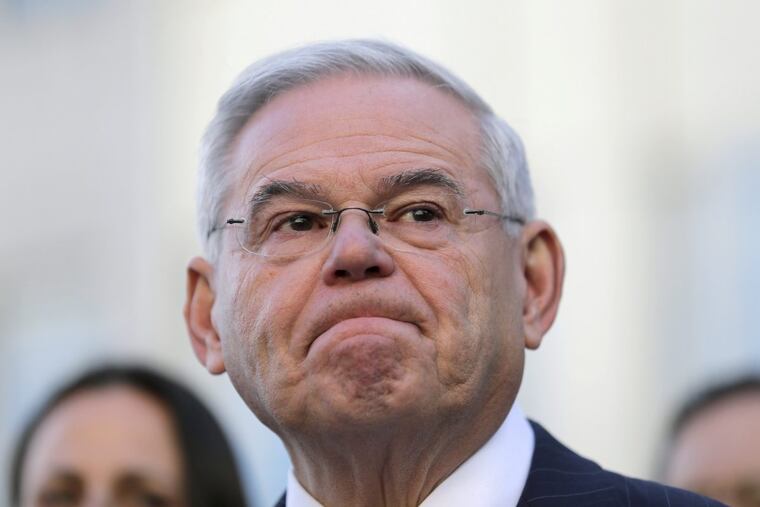Supreme Court ruling could have big impact on cases like Menendez trial | Editorial
A Supreme Court ruling that led led to the dismissal of most of the charges against a Louisiana congressman who stashed $90,000 in his freezer could play a role in cases similar to Sen. Bob Menendez's corruption trial.

The jury in the corruption trial of Sen. Bob Menendez (D., N.J.) was unable to reach a verdict despite lengthy testimony about private jet rides, lavish vacations, and more than $750,000 in campaign donations the senator received from a Florida eye doctor he claimed was only a friend.
A U.S. Supreme Court ruling last year may not have caused Menendez's hung jury, but it has made it more difficult to get convictions in public corruption cases. That may be good news for dirty politicians, but it is bad news for prosecutors trying to deter corruption, which means it is bad news for the public.
Most Americans already lack faith in their elected representatives. A recent Rasmussen poll found 56 percent of likely U.S. voters think most members of Congress are willing to sell their vote for cash or campaign contributions. The Supreme Court ruling won't change that perception.
Gov. Bob McDonnell (R., Va.) was convicted in 2014 of receiving $175,000 in loans, gifts, and other benefits from a businessman who hoped the state would promote a nutritional supplement made by his company. But the Supreme Court overturned the case in 2016, saying prosecutors failed to prove that McDonnell engaged in "official acts" in exchange for the cash and gifts.
That ridiculous ruling has led to the reversal of convictions of two powerful state lawmakers in New York and the dismissal of most of the charges against a Louisiana congressman who had $90,000 stashed in a freezer. In August, former Rep. Chaka Fattah (D., Pa.) appealed his 10-year prison sentence in part by citing the McDonnell case.
In the Menendez case, jurors were unable to reach a verdict despite strong evidence. Federal prosecutors accused Menendez of using his office multiple times to help Salomon Melgen. The senator was charged with bribery, making false statements, conspiracy, and violating the Travel Act.
Prosecutors said that over a seven-year period, Melgen plied Menendez with free trips on private jets to weekend getaways at resorts in Florida, the Dominican Republic, and Paris. Melgen gave a $300,000 check to a PAC helping Menendez's reelection campaign in the same month that the senator intervened on his behalf with a federal agency that said Melgen had overbilled Medicare.
In another instance, Menendez urged top State Department officials to pressure the Dominican Republic government to enforce a long-dormant port security contract with a company in which Melgen held an investment interest. Around the same time, Melgan promised Menendez $60,000 in campaign donations.
The senator said the junkets were gifts stemming from a longtime friendship and were not in exchange for political favors. (We should all have such friends.) After federal prosecutors began investigating the senator's travels, he wrote a $58,000 check to cover the cost of two of the private jet rides to Melgen's Dominican villa, claiming it was an oversight.
Corruption cases were difficult to prove before the Supreme Court raised the bar. Now that it has, prosecutors may be reluctant to bring charges in future cases. That will only embolden corrupt officials to see what they can get away with. Meanwhile, public trust in elected officials will continue to dwindle as government becomes more disconnected from angry voters.